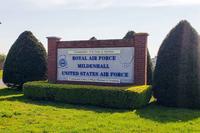CAMP BUEHRING, KUWAIT - Some South Carolina Army National Guard soldiers got a chance to focus on something more in their line recently - blowing up targets with TOW missiles.
Soldiers of Delta Company, 4th Battalion, 118th Infantry Regiment, fired 16 wire-guided TOW missiles at the Udairi Range near here, Nov. 27, scoring hits on targets like junked cars over 3,500 meters away. Cpl. Shaun Doane, of Myrtle Beach. S.C. made the hardest shot, hitting a metal storage container at about 3,660 meters.
It was a rare opportunity for the troops, made more precious by the fact that Delta Company, like other battalion units, has been performing security-force operations in northern Kuwait since deploying here in April.
While the troops have maintained their other soldier and small-arms skills here, Delta Company is the battalion's heavy weapons company, and destroying enemy armor vehicles with TOW missiles is what they do, said Company Commander Capt. Wade Broadaway.
"It's the primary mission of a weapons company," said Broadaway, of Marion, S.C. The company is highly mobile, and also wields M-19 grenade launchers and .50-caliber machine guns on its armored Humvees, he explained.
The 4th Battalion is one of 10 Army National Guard battalions which has a heavy weapons company, said Staff Sgt. Kevin Jenkins, Delta Company training noncommissioned officer and resident of Dillon, S.C.
"Not many units have a TOW company like us," said Jenkins. "It really is a big deal." The last time the company TOW gunners fired missiles was at Fort Stewart, Ga., in 2011, he recalled.
The acronym "TOW" stands for Tube-launched, Optically-tracked, Wire command-link guided. The TOW missile system includes a traversing unit, missile guidance set, a daytime optical sight and a thermal sight.
When launched, the missile spools out thousands of meters of spider-web thin copper wire - its connection to the rest of the system. Using this link, the sight and traversing unit, a TOW gunner can guide the missile, in flight, to hit and destroy a moving target at ranges of up to 3,750 meters.
Though TOW gunners do most of their qualification training in simulators, there's nothing like the real thing, according to Jenkins. On the actual system, for example, the missile may launch three to eight seconds after the gunner presses the trigger, as opposed to only two to three seconds on the simulator, he explained.
It's important for TOW gunners to experience and learn from that and other differences by firing actual TOW missiles, Jenkins said. Nine gunners from the company fired missiles from a Humvee turret and a tripod.
One of those soldiers was Spc. Quentin Hughes, a Marion resident who went from being an infantryman to being a TOW gunner in October. Though slightly nervous because of safety considerations, he appreciated the experience of firing a TOW missile.
"It's pretty fun to see it do what it's capable of doing," he said.
Hughes said he guided his missile to hit a junked car at about 3,000 meters.
"It tore it up," he said. "You saw scrap metal go everywhere."
The soldiers also enjoyed a labor-saving innovation built by Spc. Trent Trowbridge, a Knoxville, Ill. resident and member of the 444th Chemical Company, which deployed with the battalion.
Firing TOW missiles means rewinding the thousands of meters of wire they leave behind, and the troops spent about 3 1/2 hours reeling in eight missiles worth at the Fort Stewart range. This time, however, Trowbridge drove onto the range towing what amounted to be a gator engine and axle, mounted upside-down on a trailer.
The soldiers gathered up the ends of the wires and attached them to the end of the axle, Trowbridge started the engine, and soon the troops were watching the wire being neatly reeled up. Delta Company soldiers had told him about the problem, and he built the device, using discard parts, in about three hours, Trowbridge explained.
"Back home, I'm a mechanic and heavy equipment operator on a farm," said Trowbridge. "I'm glad it's working. It makes it a lot easier on everybody."























